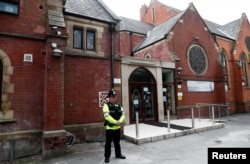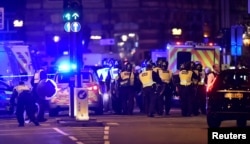For the second time in a month Britain’s security services are facing awkward questions about their surveillance policies, after it emerged the ringleader of Saturday’s terror attack in the heart of London was known to them and had been interrogated in the past.
The British-Pakistani, who police are not naming for operational reasons, was also a recognized Islamic State follower in the streets around his home in the east London district of Barking, where he tried to recruit children and proselytized openly in a nearby park, sparking a complaint to the police by a local resident.
The 27-year-old, father of at least two young children, appeared also in a television documentary last year in which he was pictured unfurling an Islamic State banner and later arguing with police during a London protest organized by radical preacher Anjem Choudary, a convicted IS recruiter.
Last month, community and mosque leaders in Manchester and neighbors of Salman Abedi, the British-Libyan who carried out the May 22 concert bombing in the city, accused the security services of missing several opportunities to identify him as a high-risk militant.
At least five times locals warned the police of their fears about the 22-year-old suicide bomber. One community worker said he contacted authorities after Abedi said being a suicide bomber was OK.
Insufficient response
Neither Britain’s domestic intelligence service MI5 nor the Manchester police responded to the claims, but lawmakers have demanded to know why Abedi was seen just as a peripheral figure and one not requiring surveillance and investigation.
Similar questions are being prompted again in the wake of the van-and-knife attack in the London Bridge district of Britain’s capital. Erica Gasparri, a mother of three who lived in Barking told local media she had reported Abedi two years ago, after he approached kids in a local park. She says she confronted him after her two children came home and said, “Mummy I want to become a Muslim.”
The parents of the ringleader of Saturday’s attack are reported to have been asylum seekers from Pakistan. According to local media, the man, nicknamed Abz, worked at various times for a fast-food outlet, a clothing store and subsequently for the London Underground system.
A onetime friend of the ringleader also told the BBC that he warned police, alerting them to comments made about previous terrorist attacks in Britain and of his alarm at the man's increasingly extremist beliefs. The friend said the alleged attacker was a keen follower of American radical preacher Ahmad Musa Jibril and would watch YouTube videos of the cleric.
“He used to listen to a lot of Musa Jibril,” he told the BBC. “I phoned the anti-terror hotline. I spoke to the gentleman. I told him about our conversation and why I think he was radicalized ... I did my bit, I know a lot of other people did their bit, but the authorities did not do their bit,” he added.
Security strategy review
A senior Conservative official told VOA that there is deep frustration in Downing Street about Saturday’s attack and the fact that at least one of the assailants was known to the authorities.
Prime Minister Theresa May promised to review Britain’s counter-terrorism strategy, holding out the prospects of enhanced powers for the security services and longer jail sentences for extremists. She said she wants to take a tougher line with internet providers and social media businesses that allow extremist material on their sites.
WATCH: British Prime Minister Theresa May
Among the measures being recommended by security chiefs, according to government officials, is the power to require those on terror watch lists to wear electronic tags, a ban on the sale of unregistered SIM cards, and a ban on immediate vehicle rentals, requiring renters to wait two hours and for rental firms to run checks on them with the police.
Police and counter-terror officers launched further raids early Monday in east London. A police spokesman said “a number” of people had been detained. Local residents reported hearing bangs and gunshots during the raids. On Sunday, police arrested 12 people, seven women and five men in connection with Saturday’s terror attack. One of the men has since been released from custody.









